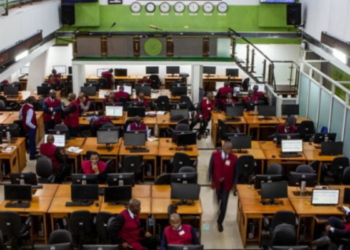According to data tracked by Nairametrics from the Nigerian Exchange Limited (NGX), the NGX banking index, which gauges the performance of listed banking firms, has seen an impressive growth of 59.57%.
The index has risen to 666.22 points, up from its opening level of 417.50 points in January.
Historically, the banking sector has often been among the beneficiaries of an environment characterized by inflation and rising interest rates. In light of this, market experts maintain an optimistic outlook for the sector from a macroeconomic perspective.
Analysts project that despite the prevailing policy uncertainties, the current growth trajectory of the index suggests the banking sector is likely to sustain its upward momentum through the end of the year.
This optimism is fueled by positive investor sentiment, signalling strong market confidence in the industry.
Additionally, experts concur that the banking sector will continue to flourish, particularly in the current climate of increasing interest rates.
The data and expert opinions collectively indicate a promising future for Nigeria’s banking sector, even as it navigates challenges in the broader economic landscape.
What investors are saying
The managing Director, of Crane Securities Limited, Mr. Mike Eze in a chat with Nairametrics said the banking sector’s profitability increases with interest rate hikes adding that institutions in the banking sector, such as retail banks, commercial banks, investment banks, and brokerages have massive cash holdings due to customer balances and business activities.
According to him increases in the interest rate directly increase the yield on this cash, and the proceeds go directly to earnings.
Eze said that interest rates and bank profitability are connected, with banks benefiting from higher interest rates.
- “When interest rates are higher, banks make more money, by taking advantage of the difference between the interest banks pay to customers and the interest the bank can earn by investing,” he said.
Eze said unless something drastic happened in the economy, the trajectory was supposed to take off from the positive third-quarter performance.
- “We expect that the last quarter of the year will be better than the just-concluded third quarter. The dividend will also surpass what was obtained in 2022. ”
He noted that if the banks adhere to their core duties which is retail banking- receiving and paying money, they are likely to rake in more income adding that there is now more financial inclusion in the baking industry in terms of savings and deposits from the Nigerian large population.
The inclusiveness was brought about by the cashless policy of the previous administration which was a monetary policy decision.
This policy gave banks leeway in terms of performance and their incomes were enhanced.
The deregulation of the oil sector and the removal of oil subsidies brought indirect devaluation of the Naira exchange rate to the US dollar. That increases the money supply and the volume of currency going into the banking system.
The more money in the banks, the more profits they make. Also, the interest rate went up with more bankable products which translated to more income to banks directly or indirectly.
In the last quarter, there is going to be an improvement in the third quarter and by implication, the banks are going to make more money.
Eze said there is more inflow of income into the federation accounts resulting from the oil subsidy removal adding that the states are smiling to the banks after the end of the federation account meeting every month, and banks charge commissions to the accounts of these states.
“All these will also translate to more income and boost confidence in stock prices.
We have high expectations for the banks in the last quarter of the year.
There will be a higher yield from the sector compared to what was obtained before. Investors are advised to take position now for capital gains against the end of the year,” he said.
The Managing Director of Cowry Asset Management Limited, Mr. Johnson Chukwu, noted that the outlook of the banking sector in terms of profitability is positive owing to the high-interest rate environment.
- “The banks are now enjoying an increase in net interest margin due to higher interest rates. They are now enjoying the windfall, but the concern is that many business operators may not be able to meet loan obligations under the present rate hike,” he said.
He noted that the sector is expected to benefit from the country’s robust economic growth, which opens avenues for increased banking activity and lending opportunities, providing a favourable backdrop for the sector’s expansion.
Chukwu said the initiatives aimed at increasing financial inclusion are widening the customer base for banks.
- “This expansion into previously underserved markets augurs well for the sector’s prospects and government-led reforms, aimed at creating a conducive business environment and fostering economic stability, also contribute to the positive outlook.”
The ongoing adoption of digital banking solutions is another pivotal factor. As digital banking continues to expand, it brings efficiency gains and continent services to both customers and banks.
This is technological advancement reshaping the banking landscape and offers avenues for growth,” he said.
He noted that the banks will require an increase in operating capital.
- “They need an increase of at least 200% of operating capital to be able to finance the same volume of business they have been financing previously. Many banks have gone to the market to raise additional capital to meet their operating capital needs.”
We have seen the industry aggressively adopting digital banking which is bringing down the cost of operations and enhancing their non-interest income. The industry will remain vibrant in the coming months,” Chukwu said.
Executive Vice Chairman, of Hicap Securities Limited, Mr. David Adonri said banking stocks will still be stable with stronger earnings expectations at the end of the year.
- “I think in the first quarter, the banking stocks are expected to lose some steam until close to the last month of the quarter when it will start picking up again as investors’ position for the full-year dividend.
- From the fundamental side of the banks themselves, I think the market reforms which saw the fluctuation of the Naira gave banks extraordinary income which has remarkably boosted their fundamentals. And so, for the industry, the prospects are very bright,” he said.





















